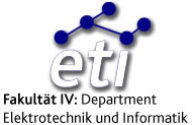Machine Learning at ETI (University of Siegen, NRW)
The Department of Electrical Engineering and Computer Science (ETI) at the Faculty IV (Natural Sciences) of the University of Siegen places a significant emphasis on machine learning in research and education. The research focus at ETI centers around machine learning and visual computing, with multiple chairs dedicated to advancing the field through regular publication in premier machine learning conferences. In addition, in 2022, the University of Siegen was awarded one of the eight highly competitive German DFG research units in artificial intelligence. Within the Learning2Sense research unit, seven professors in Siegen collaborate on an interdisciplinary project combining machine learning and sensor technology.
Furthermore, ETI recognizes the importance of incorporating machine learning into its curriculum. The department offers a vast array of lectures, seminars, and project groups pertaining to machine learning for both computer science and electrical engineering students. Additionally, ETI is one of the first departments in Germany to make a machine learning introductory lecture mandatory for all computer science BSc students. This is in recognition of machine learning’s fundamental role in computer science alongside mathematics, theoretical computer science concepts, algorithms, and data structures, databases, and software engineering.
The following table lists the relevant chairs at ETI, their research focus, and their area of application in machine learning, as well as relevant lectures.
| _ | Chair | Person(s) | Research Focus | Area of Application | Teaching |
|---|---|---|---|---|---|
| Analogue Circuits and Image Sensors | Prof. Dr. Choubey | Image Sensors Neural Networks in Analogue ICs Memristors | Near-sensor neural networks Intelligent Imagers Edge Processing | Neural Networks in Circuits (part of ASME 1) | |
| Computer Graphics | Prof. Dr. Kolb | Hybrid, Data- and Model- Driven Sensor Data Processing Differentiable Sensor Simulation and Rendering | Scene Reconstruction Computational Imaging | 3D Machine Learning (43CGM1142V) | |
| Computer Vision | Prof. Dr. Möller | Hybrid Machine Learning and Energy Minimization Methods Optimization | Inverse Imaging Problems Computer Vision | Deep Learning (43VSA0131V) Recent Advances in ML (43VSA0141V) Projektgruppe Computer Vision (43VSA0105V) | |
| Intelligent Systems | Prof. Dr. Beel | Automated Machine Learning (AutoML) Curriculum Learning Few-Shot Learning (Siamese Neural Networks) | Recommender Systems Search Engines | Introduction to Machine Learning (43ISG1188V) Einführung in Complex and Intelligent Software Systems (43ISG1122V) Recommender Systems (43ISG3101V) Project Group AutoML & RecSys (43ISG3401V) Machine Learning Competition Seminar (43ISG3301V) Praktikum Maschinelles Lernen (43ISG1505V) | |
| Interconnected Automation Systems | Prof. Dr. Wallscheid | Data-driven control engineering Physics-informed machine learning modeling for dynamical systems | Electrical power systems (e.g, power electronic sand drives) Mechatronic systems (e.g., robots) | Reinforcement Learning (43IAS3000V) Data Science for Dynamical Systems (43IAS2000V) | |
| Media Informatics | Prof. Dr. Blanz | Medical Shape Processing Human Visual Perception | Machine Vision / Maschinelles Sehen (43Mi12000V) Statistical Learning / Statistische Lerntheorie (43Mi11000V) | ||
| Model-Based Engineering | Prof. Dr. Lochau | Machine Learning in Complex Software Systems | Machine Learning for Software Configuration and Software Quality Optimization Quality Assurance of ML/AI-based Software Components | Applications of ML in Software Engineering (in Softwaretechnik II, 43MBE1009V) Selected topics on ML/AI in Software Engineering and Software Quality Assurance (Seminar Model- Based Engineering, 43MBE1016V) | |
Ubiquitous Computing | Prof. Van Laerhoven | Embedded Learning | Activity Recognition Wearable Sensing | Seminar Data Science (43UCO1117V) | |
| Operating Systems and Distributed Systems | Prof. Roland Wismüller Sven Jacobs | Pattern recognition in sensor data AI in teaching | Event recognition in cars AI-based tutoring in computer science education |
For feedback about this web page, please contact Prof. Joeran Beel.
Aktualisiert um 11:32 am 19. January 2022 von Joeran Beel



